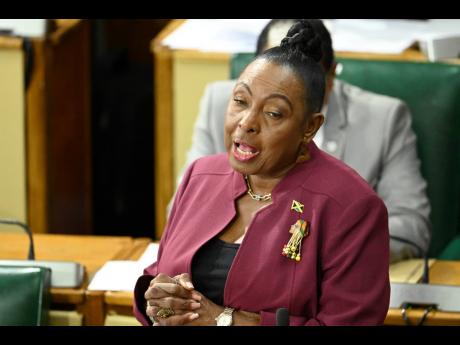Grange to seek parliamentary protection for Rastas
Western Bureau:
Despite positive developments such as an official state apology for the 1963 Coral Gardens incident, which saw Rastafarians being killed, brutalised and have their locks trimmed against their wishes, the efforts to normalise the relationship between Rastas and the State remains a thorny affair.
In fact, Olivia Grange, minister of culture, gender, entertainment and sport, had to intervene recently to block a school from barring three Rastafarian students from sitting their end-of-year examinations because their parents refused to have them vaccinated on religious grounds.
“The emergency with the unvaccinated students made me realise that there are some matters relating to the Rasta community that need confirming by law here in Parliament,” said Grange, during her contribution to the Sectoral Debate in the House of Representatives last week. “Rastas have recently sent me a list and asked me to meet with them and hammer them all out. Most date from before my time, but I see that God has put it in my hands to do what is right.”
The parents of the Rastafarian students flatly refused to have them vaccinated on religious grounds, which the school was not in agreement with. Through Grange’s intervention, the matter was resolved, allowing the youngsters to sit their exams.
“I looked into the matter, and it turns out that three students were being barred from sitting end-of-year exams because they had not been vaccinated as required. The parents were unwilling to have the vaccine administered on religious grounds,” explained Grange. “Thankfully, we were able to resolve the matter and the students were able to write their exams.”
Rastafarians have long embraced cultural medicines and rejected pharmaceuticals on religious grounds. This was forcefully brought to the fore during the COVID-19 pandemic when prominent Rastafarian elder Ras Iyah V told the Government that Rastas would not subscribe to any mandatory COVID-19 vaccination.
“As Rastafari, we are opposed to vaccination, and trying to force us to take it will be a breach of our fundamental rights and religious freedom,” Ras Iyah said.
With some workplaces still frowning on locks-wearing Rastafarians; and other issues such as the Jamaica Constabulary Force (JCF) still arresting Rastafarians for ganja, which they have a sacramental right to possess, Grange’s offer to seek protection for Rastafarians through Parliament appear to have struck the community as an appropriate step.“There is no room for discrimination of Rasta in the new Jamaica which we are determined to build. We must live together in harmony, respecting each other’s cultural identity and expression,” said Grange, whose has regularly championed Rasta’s role in Jamaica’s cultural identity globally.
“This Government is deliberate about engaging with, celebrating, and setting things right with our Rastafari brothers and sisters,” added Grange.
On April 3, 2017, Prime Minister Andrew Holness apologised to the Rastafarian community for the atrocities committed in Coral Gardens in 1963 and declared that the Government would ensure that no incidents of such a nature ever happen again.

